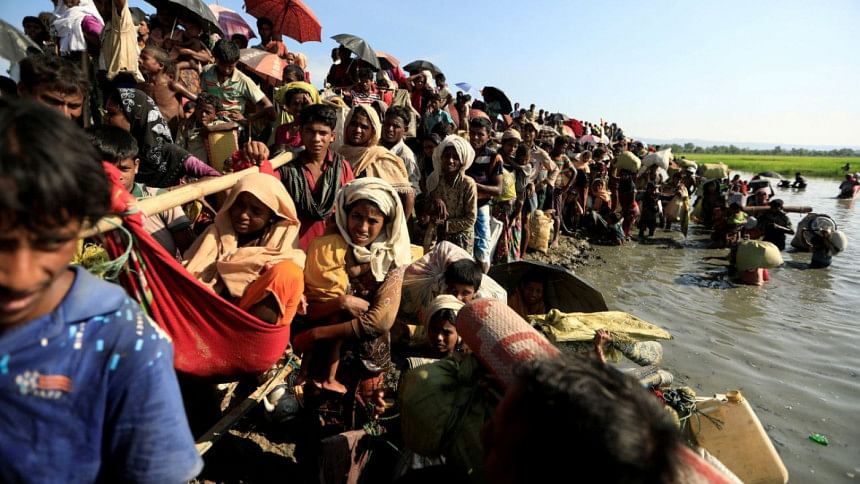Force Myanmar to face ICC for atrocities: Southeast Asian MPs

More than 130 lawmakers from across Southeast Asia yesterday demanded the international community bring officials in Myanmar to justice for the atrocious crimes it committed against its Rohingya population in Rakhine State.
In a joint statement, 132 sitting MPs from five countries --Indonesia, Malaysia, the Philippines, Singapore, Timor-Leste -including 22 members of Asean Parliamentarians for Human Rights, called on members of the UN Security Council (UNSC) to refer the situation in Myanmar to the International Criminal Court (ICC).
Since Myanmar is not a signatory to the Rome Statute, the ICC does not have the jurisdiction in the country and only the UNSC can trigger an investigation by the Court, according to the statement UNB received from Jakarta.
"One year has passed since the Myanmar military launched its murderous operation in Rakhine State, yet we're no closer to seeing those responsible brought to justice. As Myanmar is clearly both unwilling and unable to investigate itself, we're now at a stage where the international community must step in to ensure accountability," said APHR Chairperson Charles Santiago, a member of Malaysian Parliament.
"I stand together with 131 of my elected peers in calling on the members of the UNSC to immediately refer the situation in Myanmar to the ICC. Those in Myanmar responsible for these horrific crimes must be held to account; they cannot be left free to commit the same abuses again in the future," said Santiago.
The lawmakers recognised the crucial role played by their own governments in pursuing accountability.
They urged members states of the Association of Southeast Asian Nations (Asean), including Indonesia, which will take a seat on the UNSC next year, to press the Myanmar government and military to end all forms of human rights violations against the Rohingya and other ethnic minorities.
They also urged the international community to support the calls of Yanghee Lee, the UN Special Rapporteur on the situation of human rights in Myanmar, to establish an international accountability mechanism aiming to impartially investigate human rights violations in the country.
On August 25, marks the one-year anniversary of the Myanmar's military launch of an operation in Rakhine in response to what Myanmar says attacks by Arakan Rohingya Salvation Army on police posts.
Security forces and their proxies killed thousands of Rohingya, burned villages to the ground, committed widespread sexual violence and drove more than 700,000 people to flee into Bangladesh, reads the statement.
Although human rights groups have credibly documented violations against Rohingya that amount to crimes against humanity, Myanmar officials have largely ignored that any abuses have taken place.
While Nay Pyi Taw has announced a "commission of inquiry" into the events in Rakhine State, Myanmar has a long track record of establishing similar bodies which have almost never led to any genuine accountability.
This lack of accountability is affecting people in other ethnic areas too, including Kachin and Shan State, where the Myanmar military has committed war crimes and displaced thousands.
"Time has run out for Myanmar's internal procedures which have only meant to deflect international pressure and are not mandated to seek genuine accountability. Asean countries must set aside their destructive 'non-interference' policy and take genuine action. Justice for the Rohingya is an issue that goes beyond regional politics -- it concerns humanity as a whole.
We cannot allow these atrocities to take place in one of our member countries with complete impunity," said APHR Board Member, Eva Kusuma Sundari, a member of the Indonesian House of Representative.
Kusuma Sundari said the fact that more than 100 sitting parliamentarians from across the region are willing to speak up showing the level of regional support for the Rohingya, and for human rights. Governments must now follow suit and condemn Myanmar for its horrific policies and practices.
"We're combining our voices with all those around the globe that are demanding the world stand up against atrocious crimes and bring those responsible to account."

 For all latest news, follow The Daily Star's Google News channel.
For all latest news, follow The Daily Star's Google News channel. 









Comments